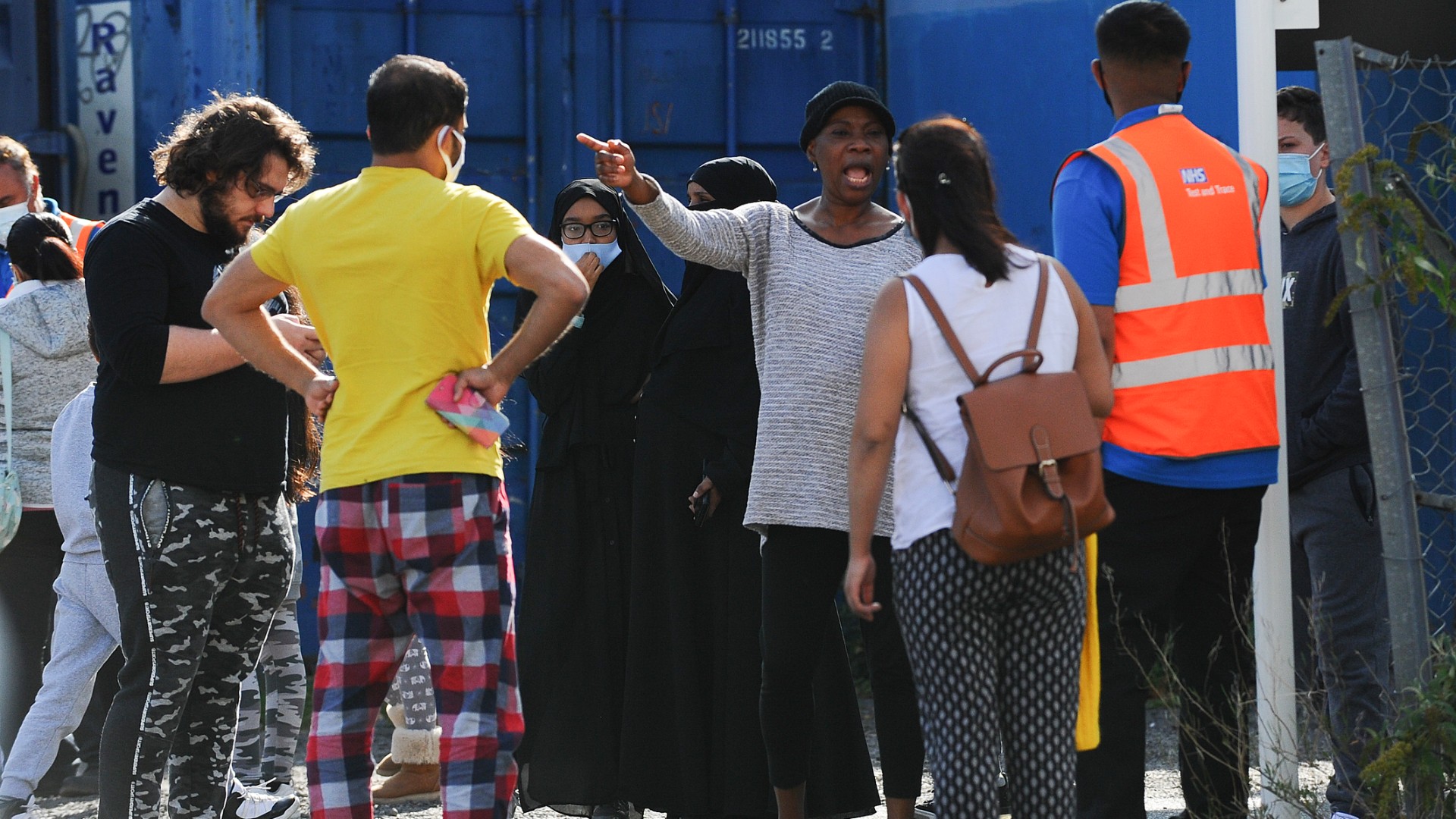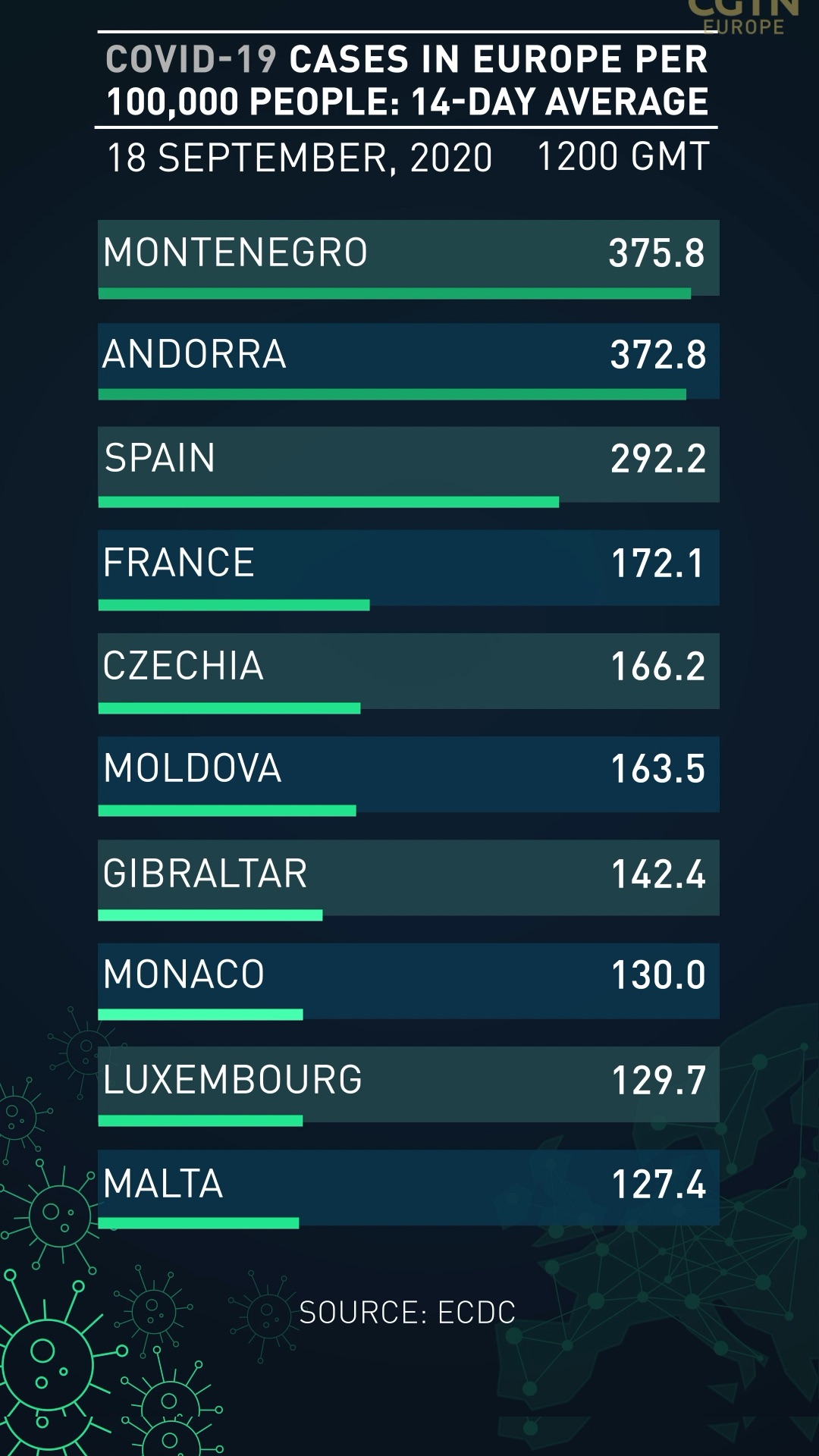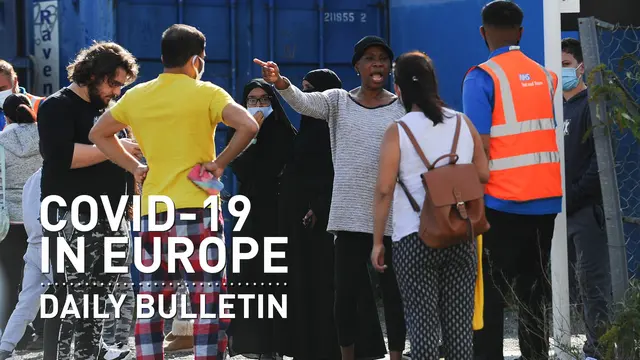TOP HEADLINES
•With case numbers rising, countries across Europe have tightened restrictions to fight the spread of COVID-19. Denmark will lower the limit on public gatherings from 100 to 50 people and order bars and restaurants to close by 10 p.m. Ireland will prohibit indoor restaurant dining. **Czechia **is to limit opening hours, ban stand-up indoor events and mandate face masks in schools.
•Other countries have opted for regional measures. Spain will limit movement between and within high-risk areas around Madrid. Britain will prevent household mixing and late hospitality across large parts of central and northern England. Iceland is closing venues and pubs in the Reykjavik area for four days. The Netherlands is preparing "regional" measures expected to include lower numbers at gatherings and earlier closures. Greece is targeting the greater Athens area: suspending concerts, limiting gatherings to nine people and demanding 40 percent of work is done from home. In France , Nice will ban gatherings of more than 10 people in public spaces and tighten rules on alcohol consumption outdoors.
•The EU wants to raise more money to shore up its supplies of potential COVID-19 vaccines after estimating that the number of shots available next year around the world might fall short of demand.
•Europe's healthcare regulator has endorsed using dexamethasone to treat COVID-19 patients with breathing difficulties, paving the way for the steroid to become the region's second approved treatment for the respiratory illness.
**•Germany has joined France in deciding against buying potential vaccines **through the World Health Organization's COVAX program, because it is already sourcing potential vaccines through a European Union scheme.
•Scientific advisers told the British government this month that just 6 percent of the UK population had antibodies to COVID-19. The Scientific Advisory Group for Emergencies warned that current levels of immunity were unlikely to mitigate the impact of "a significant winter resurgence."
**•Russia has approved R-Pharm's Coronavir treatment for outpatients **with mild to moderate COVID-19 infections and the antiviral drug could be rolled out to pharmacies in the country as soon as next week, the company said on Friday.
•French president Emmanuel Macron insists the country's response to the resurgence must be "lucid, very transparent, demanding but at the same time proportionate."
•The European Union has agreed to buy a potential COVID-19 vaccine from Sanofi and GSK in its second such deal to secure supplies. The French and British drug makers teamed up to manufacture a recombinant protein-based vaccine they hope to get approved next year.
•The UK's health minister, Matt Hancock, said the infection rate was accelerating across the country, and that "the number of people in hospital is doubling every eight days or so." Figures suggest a sharp rise in London, from 18.8 cases per 100,000 people to around 25 and more than 30 in some boroughs.
•A British one-hour lab-free test is accurate in almost all cases , an academic review in
The Lancet
has found. Approved for clinical use in April, DnaNudge correctly identified 94.4 percent of tests with COVID-19 and 100 percent of those without.
•Working from home "remains a practice that is highly recommended," French employment minister Elisabeth Borne said on Friday, as president Emmanuel Macron's government battles to contain a likely second wave of the COVID-19 virus.

A woman reacts as an employee of the NHS Test and Trace program talks to people who arrived with an appointment but were unable to get a test in Catford, southeast London. The site closed down with members of the public still arriving. /Daniel Sorabji/AFP
At this rate, the number of infections would double every week and we absolutely cannot have that
- Mark Rutte, prime minister of The Netherlands
ACROSS EUROPE
Stefan de Vries in Amsterdam
The rapidly increasing number of infections in the Netherlands has forced Prime Minister Mark Rutte and the coronavirus minister, Hugo de Jonge, to give an extra press conference on Friday night.
Most infections are concentrated in cities with a large number of students (Amsterdam, Rotterdam, Utrecht and Leiden), some of whom continue to socialize without respecting social distancing. There have been media reports that bars and restaurants in those cities must stop serving at midnight and close at 1 a.m., while the maximum number at gatherings will be reduced from 100 to 50.
Over the past 24 hours, there were 1,753 new cases in the Netherlands, the highest number ever. Last week, a record number of 195,454 people were tested, but health centers are struggling to cope with demand – in many places, people have to wait three days before a test and another 48 hours for results.
Iolo ap Dafydd in London
Despite UK Prime Minister Boris Johnson saying he will do everything necessary to avoid a second national lockdown in England, it may become inevitable. Nearly 10 million people are being affected by local lockdowns in various areas of England, Wales, Scotland and Northern Ireland. Some top scientists are said to be advising a two-week lockdown in October, perhaps coinciding with school half-term towards the end of the month.
Coronavirus cases have been doubling every seven to eight days in England. Former World Health Organization director Anthony Costello said he heard from a "well-connected person" that the government believes there are 38,000 infections per day in the UK.
The lack of testing is a major problem, but while infections are increasing, the mortality rate is not – so far. Much is likely to hinge on the effect of the UK government's "rule of six," which restricts social gatherings to half a dozen people.
Rahul Pathak in Madrid
Madrid's regional authorities have appealed to Spanish Prime Minister Pedro Sanchez for more central government help as the COVID-19 crisis in the capital threatens to spiral out of control.
It comes as the regional health ministry is set to announce targeted lockdowns in selected areas of the capital that have recorded high rates of infections. It is thought these will focus on several low-income neighborhoods located in the south of the city.
On Thursday, Spain reported there had been 4,541 new infections over the previous 24 hours, more than 1,600 of which were in Madrid. Spain has more than 600,000 confirmed COVID-19 cases, the highest figure in Western Europe.
Lucy Hough in Brussels
The average number of people testing positive for the coronavirus in Belgium has risen by 74 percent over the past week, to 978.3 per day. The peak was recorded on Monday, when 1,625 positive tests were recorded.
The reproduction, or R, rate is currently at 1.4, indicating that the pandemic is growing and the rate of infection accelerating.
Belgium's contact-tracing app has entered a second pilot phase on Friday, with 10,000 users across the country involved in testing ahead of its release to the wider public.
Several new areas in the European Union including Amsterdam, Vienna and Budapest will also become "red zones" for Belgian travelers from Friday.
00:20

FROM OUR GLOBAL COLLEAGUES
CGTN Europe special:
Redesigning the Future
CGTN China:
China has 11 vaccines in clinical trials, four in phase III
CGTN America:
COVID-19 brings early retirement wave
CGTN Africa:
Tunisia classifies all provinces as severest COVID-19 red zone
**Sign up **
here
** to get the COVID-19 Europe bulletin sent directly to your inbox**
**CGTN Europe has been providing in-depth coverage of the novel coronavirus story as it has unfolded. **
Here
** you can read the essential information about the crisis.**
Source(s): Reuters
 简体中文
简体中文




